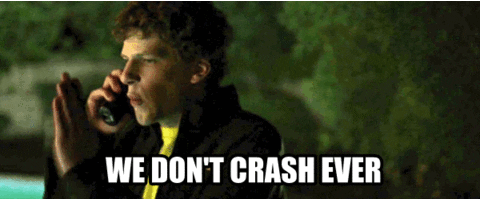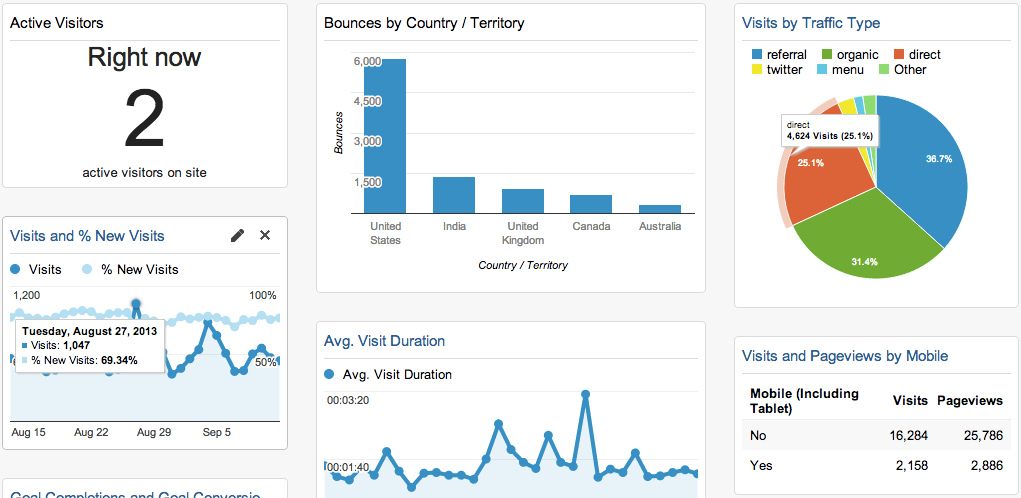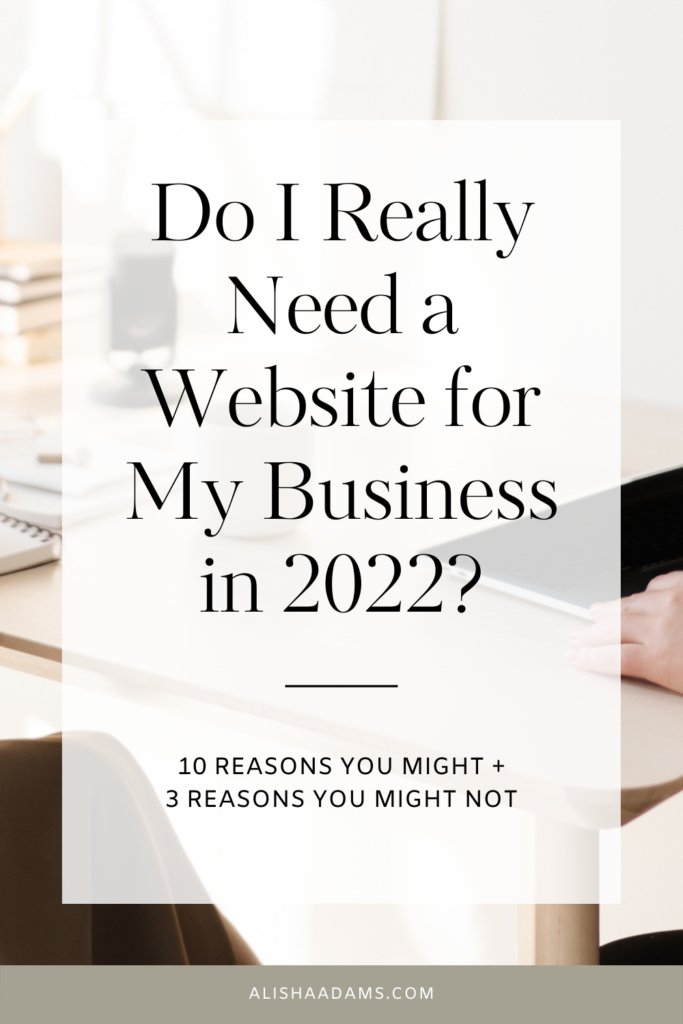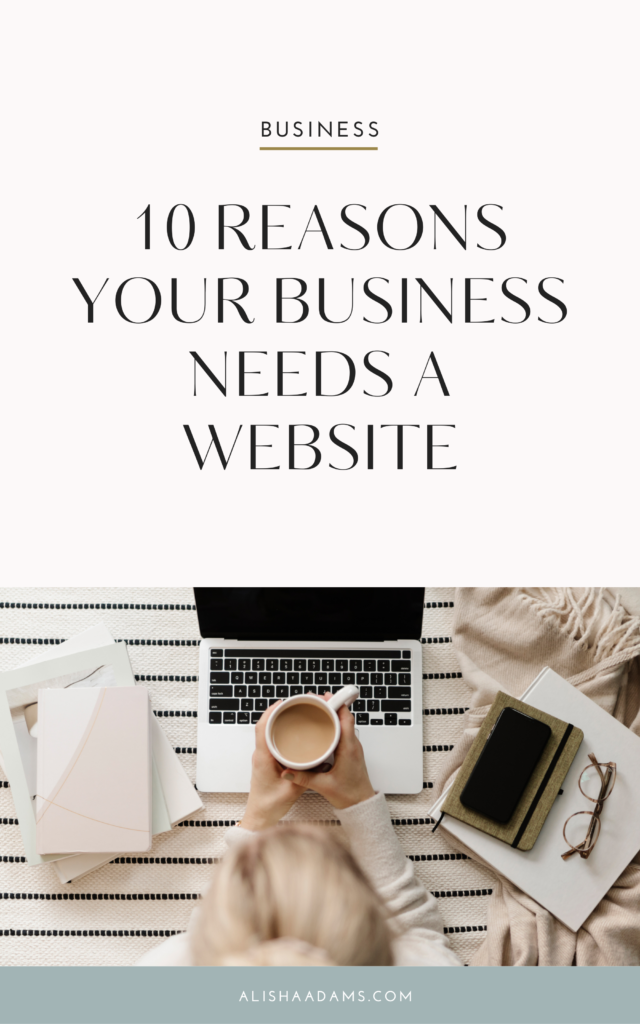If you have a product or service based business, personal brand, or are a social media influencer, have you been thinking lately, “Do I really need a business website? Isn’t social media enough?” Hot take:
Creating a website for your business is the equivalent of building a custom dream home for your family.
100% custom tailored to your needs and preferences. You picked out the perfect plot of land, picked every piece of hardware, and made sure the lighting was juuuust right. You own it, and it was made for you.
Social media? It’s like renting an apartment in a small town – not a lot of options, and it’s not yours to keep. You don’t make the rules, you’re limited on décor, and the property owner can sell it at any time.
If your business is already successful, you may feel like you don’t need a website. There are tons of reasons to justify not having a web presence outside of social media. After all, you’re creating content, getting some leads, making sales … it’s all going pretty well. But I’m here to give you 10 reasons why you should absolutely have a website for your business or brand and at the end I’ve even included 3 reasons you might not need a website for your business.
If you’re on the fence about creating a website for your business or personal brand, keep reading to learn more about why social media just isn’t enough, and why every business, personal brand, and influencer should put a stake in their own piece of internet real estate.
“But I have an incredibly successful Instagram account.
Why do I need a website?”
I’ve heard it time and time again! Your business is established. Your social media accounts are well engaged and you’re making sales. Don’t fix what isn’t broken, right? Before we talk about what a website can do for you, let’s first talk about 6 reasons why relying solely on social media for your business isn’t a great idea.
1. You don’t own your instagram page
Or your Facebook page, TikTok page, Clubhouse account – none of it. You’re completely at the mercy of another company and their decisions. That Instagram algorithm that is constantly changing? Facebook deprioritizing business posts that aren’t boosted or paid for? The death of the chronological feed that hurt so many small businesses, influencers, and personal brands? Instagram’s switch to focusing on video instead of beautiful imagery?
Yeah, those are smart, tactical decisions for companies like Facebook and Instagram. And although I don’t believe algorithms are “out to get you” or purposely making it hard to be successful, I know that it can be difficult to keep up with all the changes.
And don’t get me started on the lack of customer service when you have an issue with your account! A friend of mine had her IG account hacked, and she lost over 22,000 followers. Instagram customer service did nothing to help her. Thankfully she had a really engaged audience that spread the word about her new account, and she’s recovering from the whole ordeal, but even if she regained all 22k followers overnight, she still lost all her content, engagement, analytics, and power within the algorithm.
2. You’re constantly competing on social media
Even if you have the greatest content in the world, your viewers are only a short scroll away from having your competitor’s content in front of their faces. Other brands or influencers can even use the power of Facebook Pixel to create targeted ads that come straight for YOUR followers!
Trying to run your brand on social media is like running a mall kiosk stand – competitors can see everything you’re doing and potential customers can plainly see all the other options in front of them.
3. We all have short attention spans on social media
I can’t begin to tell you how many times I’ve sent a TikTok or Reel to my friend Isabel with a comment saying, “OMG look at this cool product!” then promptly ~forgot about it~ forever.

The big thinkin’ thing inside our skull is so busy jumping from one topic to the next while we’re scrolling that our brains make an intentional choice to filter out a lot of the information we take in. It’s nothing personal against you or your content – it’s just science!
4. Social media isn’t SEO friendly
Think about this: when you head over to Google and search “personal trainer near me”, Jim Buffguy’s TikTok account isn’t popping up. It’s likely that unless you’re searching for a specific person’s name that you won’t see any social media profiles on the first page of Google. Look, I even tried it myself:
See? No Instagram account in sight.
5. The content isn’t evergreen
No, not evergreen like the trees. Evergreen content is content that keeps working for you long after you post it. Ever clicked something on Pinterest only to find out it’s a blog post from 2008? Yeah, THAT’S evergreen.
The sad truth is that social media posts have short lifespans. According to The Refinery, Instagram posts live for about 48 hours, Facebook posts last about 6 hours, and Twitter posts last a mere 15 minutes unless they go viral.
And, sure, you can sell on social media, but that’s not the main purpose. The purpose of using social media for your business or brand is to build your “know, like, and trust” factor. It’s to educate, inspire, and connect with your audience. I’m a big believer that social media is not optional in today’s entrepreneurial landscape, but it’s critical to remember that it serves a completely separate purpose from a website.
Now that we’ve discussed why social media alone isn’t enough, let’s talk about the benefits of a website
1. They’re very SEO friendly
Did you know that Google processes over 8.5 BILLION searches each day? You read that right … billion with a “B”. That’s a lot of opportunities to get your name, your product, your brand, and your content in front of the right people.
And what if I told you that 93% of online experiences begin with a search engine? Open laptop > go to Google > search for thing. Pull out phone > open Safari > search. That’s how over 90% of internet use starts!

These complex algorithms from search engines like Google, Bing, and Yahoo have little bots that crawl your website and read it’s content, watch user behavior, and decide what web pages are relevant to specific searches. As you create and maintain your website, you have lots of control over these factors and can start to rank for certain keyword searches. The same simply can’t be said about social media
2. A website makes you more credible
Even as older generations stop using technology, society relies heavily on websites to get information about a business or brand before handing over their hard-earned money. An extensive survey by Verisign confirmed that 84% of today’s consumers think a website makes a business more credible than ones who only have social media profiles. Reflect in your own life and think of how many businesses you’ve given money to that have websites, versus ones that don’t. I guarantee the difference is staggering.
3. It Isolates you from the competition
Once someone gets to your website, there’s no other competition on the screen that you need to compete with. It’s just you and them – holding hands taking a nice romantic stroll through the experience you’ve created for them. As long you can keep their attention, you’re one step closer to creating a life-long fan.
4. You can control the customer journey
On your website you get to dictate what you want the user experience to be. You can ask users to sign up for an email list, read a blog post, or shop a collection of products.
Maybe you use a pop up after someone adds a product to their cart encouraging them to see what products go with the one they’re purchasing. Or maybe you ask them to download your pricing and services guide before they contact you.
With a website, you get to build your site around what actions you want to encourage people to take, and you can give them an experience that will leave a lasting impression.
5. Your website keeps working even when you don’t
Go on vacation? Take time off for the holidays? Family emergency takes you away from work for a while? It’s okay. While social media algorithms will be punishing you for stepping back, your website and Google will still be hard at work. It’s like having a full-time sales employee for less than $2.00 a day! < now that’s money well spent.

6. You can clearly showcase your offers and results
You ever had that “new restaurant anxiety” … you know what I’m talking about. It’s your first time there, and you’ve never seen the menu and don’t know what cuisine it serves. You look through the menu and your brain is racing…
“What the heck is that?” “Do I even like that ingredient?” “What if I hate it?” “Where are the prices?!” The waiter has come by three times already to see if you’re ready to order and you just. don’t. know. Finally you break down and ask the waiter what they like.
Let’s rewind. This time, imagine the server hands you a menu and it’s like a book. You open it and each item has multiple pictures, detailed descriptions, lists of ingredients, and reviews from people who have had the dishes before. It breaks down meals based on category and other factors. Vegan, low carb, high protein. Want something quick? Want something cheap? It’s all laid out for you to browse through and pick the right meal for you, even though you walked in with no idea of what they even offered!
That’s what your website does for visitors. It’s like a menu of your products and services, prices, your relevant experience, and the results you’ve gotten other people. It helps people decide if what you offer is right for them, or how your brand can work with theirs.
7. You incorporate more opportunities for your audience to engage with you
Websites can be built with endless possibilities for encouraging engagement with your brand. A salon owner, for example, could have a contact form, a page to book services, a download for how to prep for a specific service, an email list sign up, comments section on a blog post about hair styles that fit different face shapes, and even one of those “spin the wheel for a discount” pop ups. Other options can include quizzes, a live chat widget, or videos to watch.
8. You can integrate plugins for specific features
If you’re a fitness influencer, you might have a plugin that lets you upload recipe ideas to your blog. A wedding designer might have a plugin for brides to rent linens, photo booths, or flatware. Maybe an esthetician has a map that users can click to get directions to the salon. And a course creator could use a plugin to create a members-only area on their website.
9. Much more detailed analytics
We all know how important it is to pay attention to your numbers when it comes to business. Revenue, expenses, engagement, profit, followers, subscribers, sales, and more. But what about the numbers that help you increase all those other numbers?
With a website you can track how many people go to each specific page, where on your page people stop to read the most, where people are clicking, and where they are on your site when they decide to leave. Integrations like Google Analytics, Hotjar, and Facebook Pixel can give you invaluable insights into what your potential customers are doing when they interact with your brand. Those insights can be used to offer new products, clarify your brand message, or revamp your customer journey.

10. Your website’s ROI compounds
While each social media post loses value as the days go by, your website does the opposite. As your site spends more time on the web, it’s gaining value. With every visitor, page view, click, scroll, and link it creates more authority on the web.
Now, that’s not to say you can just “set it and forget it”.
You still have to maintain your site, add content, update product descriptions, and refresh testimonials.
It’s kinda like a house. Once it’s built and furnished, you just need to do your routine maintenance and cleaning, and your equity will continue to increase over time.
Ok, so I hope I’ve made a good case as to why you really should have a website
But there’s always two sides to every story. Here’s 3 reasons you may NOT need a website for your business or brand.
1. You have plenty of leads
If you get most of your leads on referrals, and you’ve got more than you know what to do with, you may decide you don’t want to invest time and energy into a website.
2. You don’t want your business to grow
If you’re a one-person operation and you simply don’t want to take on more clients, offer more services, or expand your reach then a website might not be necessary.
3. You operate in a virtual monopoly
If you’re the ONLY ONE who does what you do and you don’t have to worry about competition then word of mouth referrals could be more than enough for your business.
If you’ve read this far and now you’re thinking, “I don’t even know where to start.”
Have no fear. Over the next couple of weeks I’ll be writing content all about websites, from which website platform to start with (WordPress, Showit, Squarespace, Wix, etc.), to how you can set up a beautiful website for way less money than you might think (I’ll give you a hint – I pay less than $1.50/day), to the most important questions your website must answer, and even the top website mistakes I see repeated over and over again.
If this blog post has been helpful to you, please leave a comment below and subscribe to my newsletter so you never miss a post! And don’t forget to follow me on Instagram for inspiration and business education!


- Hide Comments